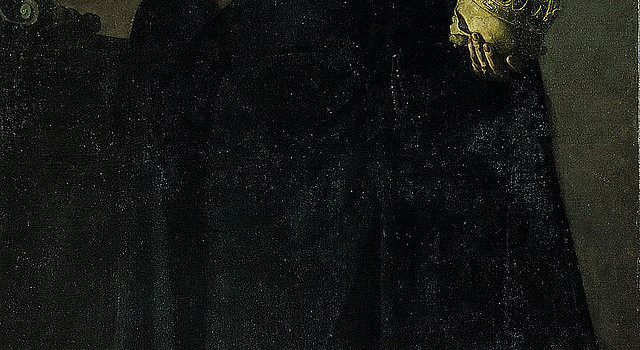
 Francis was born the first of 17 children to a noble family in Valencia, Spain. Though his family had a tumultuous ancestry, several of his relatives became priests — even two popes — and sisters, often leaders of their abbeys.
Francis was born the first of 17 children to a noble family in Valencia, Spain. Though his family had a tumultuous ancestry, several of his relatives became priests — even two popes — and sisters, often leaders of their abbeys.
Francis was a young nobleman at the court of the King of Spain. He became the fourth Duke of Gandía when he was only thirty-three and lived a happy, full life with his wife Eleanor and their eight children. Francis was a model Christian gentleman, a man of God. He rejoiced in receiving Holy Communion often.
Sadly, Eleanor died when Francis was only 36 years old. Francis astonished the nobles of Spain by giving his position as duke to his son Charles, to pursue becoming a Jesuit priest. But he remained in the world, as authorized by the pope, to care for his children. He founded the Jesuit College in Gandía, which was made a university by papal bull in 1547. In 1550 Francis went to Rome, where he was received by St. Ignatius Loyola; his entry into the Society was made public. He returned to Spain in 1551, where he was ordained a priest. His first Mass was so well attended that an altar had to be set up outside the church and the Mass lasted several hours. Francis was a man of humility and preferred to cook, sweep, serve food, and kneel at his brothers’ feet, rather than be treated as if he was still a duke. His superior encouraged his humble acts.
St. Ignatius named Francis commissary general of the Spanish provinces in 1554, and he was chosen General of the Society of Jesus in 1565. During his period of preaching throughout Spain, he became acquainted with St. Teresa of Ávila. He was one of the first to recognize her greatness.
The Order made great progress during Francis’ seven-year rule as General of the Jesuits. He’s been called its second founder because he helped establish the rule of the Society, revising it in 1567. Francis helped improve the Roman College (now the Gregorian University), which he had partially endowed at its inception. He encouraged foreign missionary work among the Jesuits. He built Sant’Andrea on the Quirinal, began the famous Gésu church in Rome, established the Polish Jesuit province, built colleges in France, and opened American missions. In 1566, when the plague ravaged Rome, he raised money to help the poor and sent Jesuit priests to hospitals to care for the sick.
Remaining humble, Francis accomplished wonderful works for God’s glory as he preached and advised leaders. Under his guidance, the Jesuits grew to be a great missionary society, assisting the Church far and wide. Through all his successful endeavors, St. Francis Borgia remained joyfully humble. Francis died September 30, 1572, and was canonized in 1671.
Other Saints We Remember Today
St. Ghislain (Gislenus) (680), Abbott










